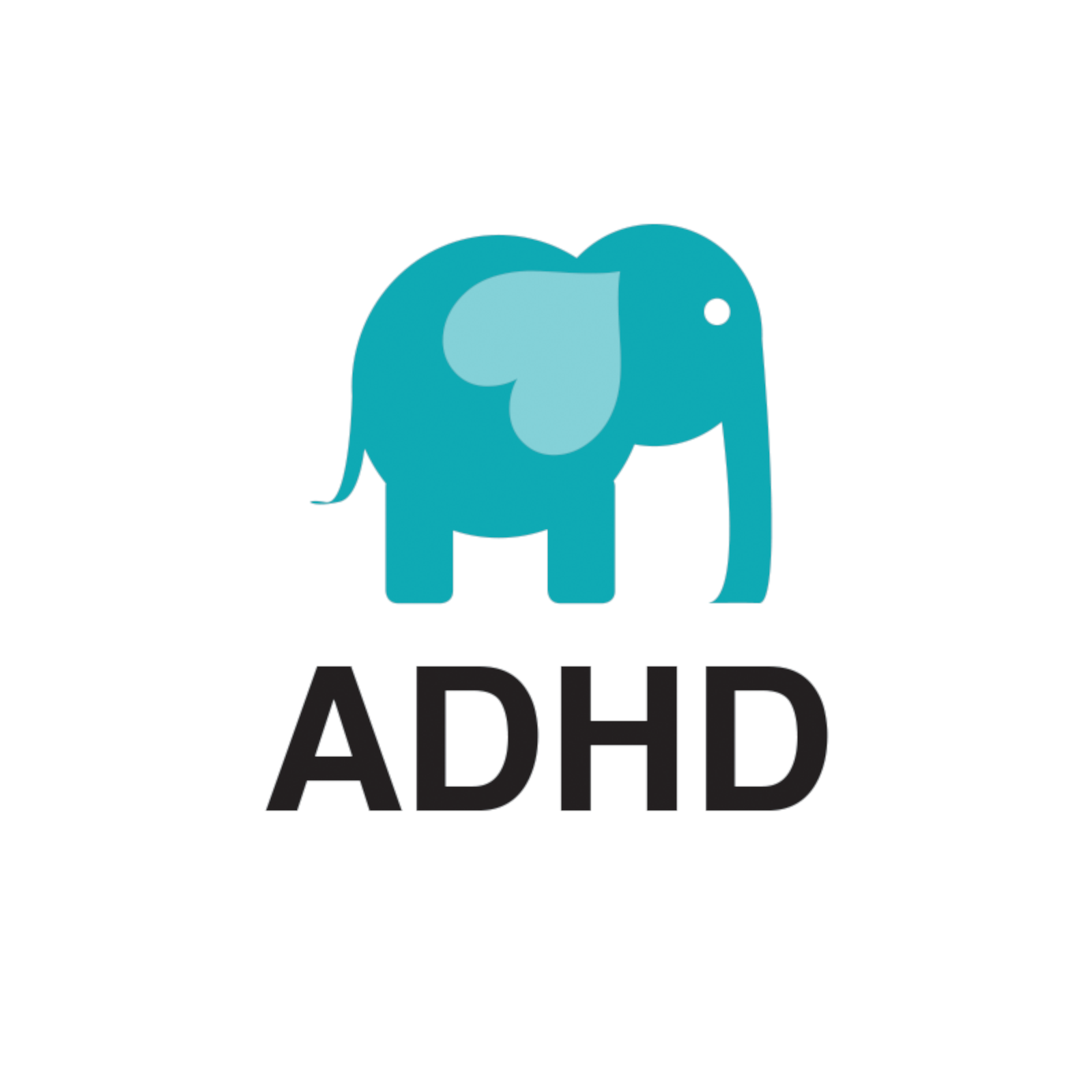
809.4K
Downloads
213
Episodes
Drawing on years of experience working with families, Parenting Coaches Siope Kinikini and Kimber Petersen share how families can improve, heal, and find success using the proven methods of the Teaching-Family Model. Visit smarterparenting.com to learn more.
Episodes
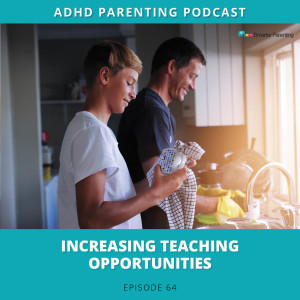
Wednesday Jan 29, 2020
Ep #64: Increasing teaching opportunities
Wednesday Jan 29, 2020
Wednesday Jan 29, 2020
Increasing our teaching interactions means that we are both teaching new behavior skills and reinforcing those skills that have already been taught.
If we only teach behavior skills but don’t show our kids how to use those skills in their everyday situations, they won’t be effective. They need to learn how to apply what they have learned when they are upset, frustrated, or happy.
Teaching opportunities apply to every member of the family. While we may be teaching a specific behavior to one child, we should be helping all members of the family deal/cope/or help with that behavior skill. We may be teaching one child to reduce negative behaviors while preparing the rest of the family to use Effective Communication to describe how those negative behaviors make them feel.
The more parents can involve all members of the family in teaching and using skills; the more successful your child will be.
For more information about how Smarter Parenting uses the Teaching-Family Model, visit the episode podcast page on SmarterParenting.com
https://www.smarterparenting.com/adhd-parenting-podcast/
Join the Smarter Parenting Club. https://club.smarterparenting.com/
Help the ADHD Smarter Parenting Podcast continue. Donate today! https://www.smarterparenting.com/donate-now/
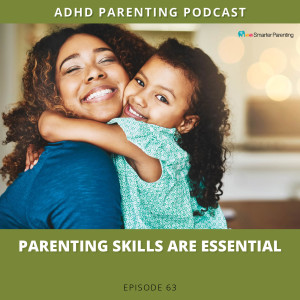
Monday Jan 27, 2020
Ep #63: Parenting skills are essential
Monday Jan 27, 2020
Monday Jan 27, 2020
Raising kids today has its challenges, which is why Parenting Skills are essential. Parenting Skills give parents and kids the tools they need to navigate the world around them successfully.
Parents face different challenges than previous generations. There are more pressures when it comes to school, work, and family, and many parents know that there is needs to be a better way to raise their kids than how they were raised.
Parenting Skills found on Smarter Parenting help families work together to build a strong connection and to solve problems. Parenting Skills help parents teach their children to make better decisions, prevent problems, give praise, and improve communication.
Parenting skills prepare kids for being adults and work for children of all ages and are adaptable as your children grow. Putting effort in when your children are little, will provide returns as your child grows.
We have a parental responsibility to reach out and to get the help we need. If you need assistance, we invite you to find help. Our Parenting Coaching process will allow you to talk to a coach who can give your family precise information tailored to your family. We also invite you to visit SmarterParenting.com and learn the parenting skills of the Teaching-Family Model.
If you want a better relationship with your child, you have to learn Parenting Skills. They are crucial for establishing trust and building strong bonds.
For Parenting Skills visit: https://www.smarterparenting.com/lesson/
Join the Smarter Parenting Club. https://club.smarterparenting.com/
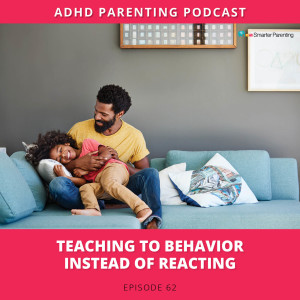
Wednesday Jan 22, 2020
Ep #62: Teaching to behaviors instead of reacting
Wednesday Jan 22, 2020
Wednesday Jan 22, 2020
When negative behaviors happen, parents have a choice. They can teach to the behavior, or they can react.
When a parent reacts, they are swayed by the child and their emotions. Parents get pulled into their child’s tantrum or bad behavior. As the child continually increases their negative behavior, parents have to increase their response, escalating the situation.
When a parent teaches to negative behavior, they are the ones to guide the child. You can remain consistent and not be drawn into your child’s tantrum. Instead of escalating the situation, you can help them deescalate the situation.
Teaching, instead of reacting, requires a parent to be aware of their limits and knowing at what point they will step in to deescalate the situation. The lower your tolerance for behaviors is, the better off your child will be as it’s easier to step in and make correcting when the behavior is small versus stepping in when the behavior is massive.
The behavior skill of Smarter Parenting and the Teaching-Family Model allow you to teach to any situation as they give you the steps--and the words--parents need to reduce behaviors, so they can teach. You can find more about the behavior skills of Smarter Parenting by listening to podcasts 46-57 or by visiting the Smarter Parenting website.
Having behavior tools at your disposal is comforting as it allows you to remain in control.
If you’re having difficulty understanding what behavior skill to use in what situation, join the Smarter Parenting Club. We will be able to help you apply the skills to your specific situation and come up with solutions that will help your child. https://club.smarterparenting.com/
For more show notes and transcript, visit the episode podcast page on SmarterParenting.com https://www.smarterparenting.com/adhd-parenting-podcast/
Help the ADHD Smarter Parenting Podcast continue. Donate today! https://www.smarterparenting.com/donate-now/
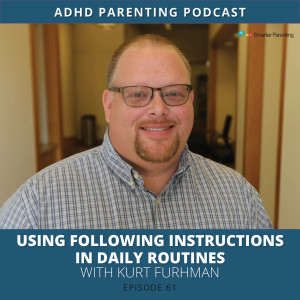
Monday Jan 20, 2020
Ep #61: Using Following Instructions in daily routines with Kurt Furhman
Monday Jan 20, 2020
Monday Jan 20, 2020
Join the Smarter Parenting Club. https://club.smarterparenting.com/
In Episode 61, ADHD Parenting Coach, Siope Kinikini talks with Kurt Furnham from Thornwell in South Carolina about how he teaches the behavior skill of Following Instructions and the importance of Following Instructions.
Thornwell is part of the Teaching-Family Association and uses the Teaching-Family Model in their residential and in-home programs.
In all of the Teaching-Family Association programs, teaching Following Instructions will be one of the first skills a child or family learn. If a child is not able to Follow Instructions, they will not be successful with the other behavior skills as all include an element of Following Instructions.
Getting kids to Follow Instructions seems is essential as they will use this skill for their whole life. They will use it when they cook a recipe, assemble a piece of furniture, do a project at work, or go through airport security. Once mastered Following Instructions become a regular part of our day.
Kurt Fulhman talks about what he has found to be successful in teaching Following Instructions to dysfunctional populations.
His first recommendation is to make it part of the daily routine and daily expectations. Following Instructions can be incorporated into chores, schedules, family traditions, meals, homework, etc. Even getting dressed can involve Following Instructions. Creating daily routines that include Following Instructions will decrease frustration and increase closeness.
Second, when incorporating Following Instructions into your daily routine, don’t make it too complicated. Start with small tasks and by giving short instructions. When a child has mastered that, continue to add additional jobs and directions.
Third, children who have never had to Follow Instructions may want to power struggle or argue. The advice: disengage until they can follow the instructions. Disengaging will allowing them to see the importance of Following Instructions and that Following Instructions benefits them.
For more information about Following Instructions, visit: https://www.smarterparenting.com/lesson/view/following-instructions/
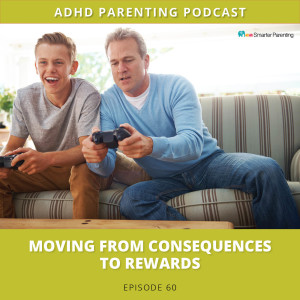
Wednesday Jan 15, 2020
Ep #60: Moving from consequences to rewards
Wednesday Jan 15, 2020
Wednesday Jan 15, 2020
When giving Effective Negative Consequences, there are things that parents should never use as these are basic rights that children are entitled too. They are common sense things but include access to healthy foods, clothing, education, safety, shelter, and sleep.
When giving effective consequences, it’s essential to make sure you are not infringing on their rights. Taking away fundamental rights will create considerable problems in your relationships and could have other, unforeseen, consequences.
There are things that kids would like to tell you are basic rights that aren’t. Access to cell phones, video games, computer time, time with friends, use of the car, fancy clothing, or junk food are not basic rights. Those things are privileges and absolutely could be used as an Effective Negative Consequence.
This means you can’t withhold dinner, which is a basic right, but you could withhold a dessert or treat as those aren’t basic rights.
When making Consequences Effective, it’s important to use the five components of the behavior skill of Effective Negative Consequences. We discussed the five components in Episode #55. We discussed the five components of Effective Positive Rewards in Episode #56. Review those podcasts if you need help making rewards or consequences effective.
While Effective Negative Consequences are valid and needed, parents will find that Effective Positive Rewards is more powerful in increasing positive behavior.
Every time a parent gives a child a consequence, they are creating a divide between their themself and their child. Shifting from a negative mind frame (Effective Negative Consequences) to a positive mind frame (Effective Positive Rewards) will be more beneficial in increasing positive behavior.
Effective Positive Rewards shows a child what they can gain by behaving a certain way, and that is much more powerful than what they could lose.
For example, if your child struggles with doing their homework, telling them they could earn 30 minutes of screen time is more effective than saying they’d lose 30 minutes of screen time.
Effective Positive Rewards helps a child take ownership of their behavior, especially if they have a say in what rewards they can earn.
Many parents have found our free Behavior Contract to be effective in giving child ownership of their behavior as it spells out the four rewards or the one consequence a child could earn.
It will take an effort to move from a mind-frame of consequences to rewards, but we promise that it will be worth the effort.
For questions about making rewards or consequences effective in your situation, join the Smarter Parenting Club. https://club.smarterparenting.com/
Help the ADHD Smarter Parenting Podcast continue. Donate today! https://www.smarterparenting.com/donate-now/
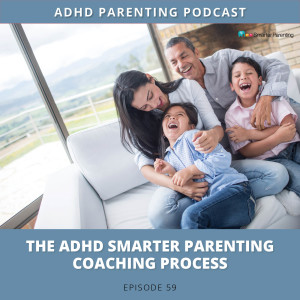
Monday Jan 13, 2020
Ep #59: The ADHD Smarter Parenting Coaching process
Monday Jan 13, 2020
Monday Jan 13, 2020
Understanding the ADHD Parenting Coaching process helps parents understand the value they'd receive from a ADHD Coaching session: https://www.smarterparenting.com/adhd-parenting-podcast/
An ADHD parenting session is all about helping parents find tailored solutions for the behavior challenges their family is facing. Is your family struggling with communication and misunderstandings? Is your family deal with defiance or anger? Is your family grappling with a lack of trust or respect?
No matter what issue you want to fix, a lot can be accomplished in a coaching session.
Once a parent signs-up for a parenting coaching session, they’ll receive a questionnaire about issues they are dealing with. This allows Parenting Coach Siope Kinikini to come up with three to four parenting techniques using the behavioral skills of the Teaching-Family Model.
A Parenting Coaching session is not to shame you or to make you feel hopeless in your ability. It’s just the opposite. Using behavioral skills for families gives parents hope and confidence, they can heal and elevate their family.
Parenting Coaching is only available through the Smarter Parenting Club. Sign-up today. https://club.smarterparenting.com/
Help the ADHD Smarter Parenting Podcast continue. Donate today! https://www.smarterparenting.com/donate-now/
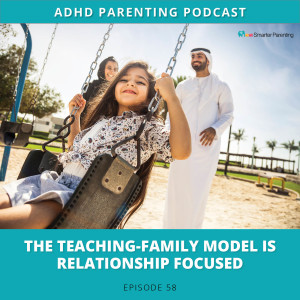
Wednesday Jan 08, 2020
Ep #58: The Teaching-Family Model is relationship focused
Wednesday Jan 08, 2020
Wednesday Jan 08, 2020
The Teaching-Family Model is all about changing child behavior by creating healthy relationships that encourage teaching and growth.
What is the Teaching-Family Model? The Teaching-Family Model is an evidence-based model to create change. The Teaching-Family Model started in the 1950s by researchers at Kanas State who set out to see what successful parents did and if that could be replicated. What they discovered is that parenting and behavior skills could be taught and be effective. The Teaching-Family Model is used by agencies around the world in group homes, foster care, in-home services, schools, and various other agencies that work with families and children.
The Teaching-Family Model focuses on what it takes to build strong relationships as they found that when relationships are healthy, correction and change are possible. All behavior skills found in the Teaching-Family Model and on SmarterParenting.com, all include an element of relationship-building--even the ones geared toward correcting negative behaviors.
The ultimate goal of all behavior skills is to build strong relationships while changing behavior! The Teaching-Family Model has changed so many families and can change yours if you’re willing to put the time and effort in!
You are not alone! SmarterParenting is here to help you deal with the challenges your family faces. Sign-up for a free 15-minute mini-coaching session today where we can talk specifically about what your family needs and what behavior skills will help you!
To learn more about the agencies worldwide that are using the Teaching-Family Model visit: https://www.teaching-family.org/
For more information about how Smarter Parenting uses the Teaching-Family Model, visit the episode podcast page on SmarterParenting.com
https://www.smarterparenting.com/adhd-parenting-podcast/
Join the Smarter Parenting Club: https://club.smarterparenting.com/
Help the ADHD Smarter Parenting Podcast continue. Donate today! https://www.smarterparenting.com/donate-now/
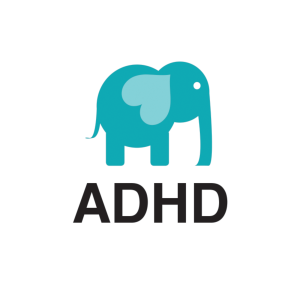
Monday Jan 06, 2020
Ep #57: Teaching kids to Accept No without issue
Monday Jan 06, 2020
Monday Jan 06, 2020
It’s essential for kids to learn Accepting No Answers as life is more comfortable when they can do so. Getting “No” answers is a part of life as “Nos” can come from a boss, teacher, family member, friend, or parent.
Saying no to kids is an integral part of establishing boundaries with kids as “no” answers help keep them from danger and teaches them self-mastery.
Parents saying no can be pretty frustrating for kids, especially if they feel that they hear “No” a lot. It’s why we recommend doing two things. First, is telling kids yes as often as possible. Don’t use “No” for something that you could say yes to. Sometimes we say “No” because it’s easier, but that doesn’t always mean that it’s right.
The second recommendation is to Role-play situations you know will be difficult for your child to Accept No Answers until they are comfortable with receiving a “no” answer. For some children, it may require them to practice Accepting No ten, twenty, or thirty times. That is okay. Sometimes hard things need extra time. Eventually, your child will get to a point where they can accept the no answer without throwing a tantrum, whining, or complaining.
There are only two steps to Accepting No. Step one: Show respect by acknowledging each other. Step two: The child says, “Okay,” and calmly accepts the “No” answer. That’s it. The power of this behavior skills lies in Role-playing situations that are difficult for your child.
This skill works on children of all ages. Many parents will find that this skill may be easier to teach to teenagers than to younger children, with teenagers being able to grasp the power of the skill with little effort.
The purpose of Accepting No answers is not to create children who can’t think for themselves. Instead, it’s to help them learn self-mastery, especially when dealing with disappointment.
There may be times when a child may not like the “No” answer they receive. Using the skill of Disagreeing Appropriately, they can state their feelings on the matter after they Accept No calmly.
The behavior skill of Accepting No Answers is coming to Smarter Parenting in 2021. Stay tuned!
For more information about the behavior skills taught on Smarter Parenting, visit the episode podcast page on SmarterParenting.com
https://www.smarterparenting.com/adhd-parenting-podcast/
Join the Smarter Parenting Club. https://club.smarterparenting.com/
Help the ADHD Smarter Parenting Podcast continue. Donate today! https://www.smarterparenting.com/donate-now/
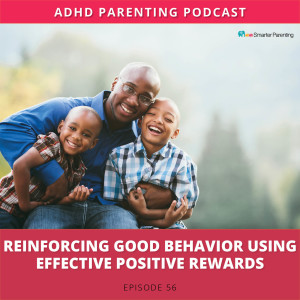
Wednesday Jan 01, 2020
Ep #56: Reinforcing good behavior using Effective Positive Rewards
Wednesday Jan 01, 2020
Wednesday Jan 01, 2020
Parents can change behavior either by reducing bad behavior using Effective Negative Consequences or by positive reinforcement using Effective Positive Rewards.
These two behavior skills are mirror skills and use the same five elements to be successful. For many parents, it’s easier to give a consequence than it is to give positive rewards. Giving positive rewards is more effective long-term in shaping your child’s behavior.
We encourage every parent to learn how to successfully use Effective Positive Rewards for behavior modification.
Rewarding your child for positive behavior will give your child confidence and encourage them to learn and grow.
What makes a reward effective? Using the five components: immediacy, size/degree, consistency, important, and varied; of the behavior skill Effective Positive Rewards allows parents to use primary reinforcers to encourage better behavior.
Immediacy means that the positive reward should be given as close to the positive behavior so they can connect their positive action with the reward.
Degree/size means that the consequence should match the behavior. This one is difficult for a lot of parents as we tend to give rewards that are disproportional to the positive behavior.
Consistent means giving a reward every time a positive behavior happens. Consistency is very comforting to children as it teaches them that they can trust you and that you’re seeing and acknowledging what they are doing well.
Important means that the reward needs to matter to your child. If you are giving rewards that don’t mean a thing to your child, they aren’t motivated to improve their behavior. By using primary reinforces that matter, your child is more likely to continue positive behavior. What matters to each child will be different and may take some trial in finding out precisely what is essential to them.
Varied means that you should give a variety of positive rewards. If parents give the same reward for all behaviors, the reward loses its effectiveness over time.
Increasing positive behavior with Effective Positive Rewards requires parents to understand what makes a reward effective, but also how to use the behavior skill Effective Negative Consequences. Rewards and consequences go hand and hand, and parents need to understand both to be effective.
Visit Episode 55, for the discussion on Effective Negative Consequences.
For more information about Effective Positive Rewards, visit the episode podcast page on SmarterParenting.com
https://www.smarterparenting.com/adhd-parenting-podcast/
Join the Smarter Parenting Club. https://club.smarterparenting.com/
Help the ADHD Smarter Parenting Podcast continue. Donate today! https://www.smarterparenting.com/donate-now/
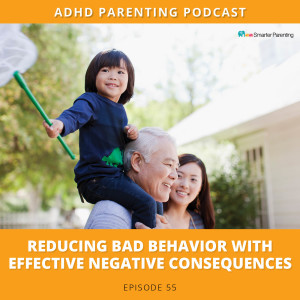
Monday Dec 30, 2019
Ep #55: Reducing bad behavior with Effective Negative Consequences
Monday Dec 30, 2019
Monday Dec 30, 2019
Consequences for bad behavior are a part of life. Learning how to give a consequence that will reduce your child’s negative behaviors takes some learning as most of the consequences parents give aren’t effective.
Giving Effective Negative Consequences reduces problems and allows parents to teach instead of punishing.
What makes a consequence effective? Using the five components: immediacy, size/degree, consistency, important, and varied; of the behavior skill Effective Negative helps parents give consequences for kids that work to reduce negative behavior and family stress.
Immediacy means that the consequence should be given as close to the negative behavior as possible so they can connect their negative action with the consequence.
Degree/size means that the consequence should match the behavior. This one is difficult for a lot of parents as we tend to give consequences that are disproportional to the negative behavior.
Consistent means giving a consequence every time a negative behavior happens. Consistency is very comforting to children as it teaches them that they can trust you and that you’re disappointed in their behavior and not in them.
Important means that the consequence needs to matter to your child. If you are giving consequences that don’t mean a thing to your child, they aren’t motivated to change their behavior. By giving consequences that matter, your child is more likely to stop the negative behavior. What matters to each child will be different and may take some trial in finding out precisely what is essential to them.
Varied means that you should give a variety of consequences. If parents give the same consequence for all behaviors, the consequence loses its effectiveness over time. By using a variety of consequences, you are ensuring that they are all valid.
Reducing bad behavior with Effective Negative Consequences requires parents to not only understand what makes a consequence effective but also how to use the behavior skill of Effective Positive Rewards in conjunction with Effective Negative Consequences. In the next podcast, Episode 56 will discuss Effective Positive Rewards. Rewards and consequences go hand and hand, and parents need to understand both to be effective.
For more information about consequences for kids and making consequences effective, visit the episode podcast page on SmarterParenting.com
https://www.smarterparenting.com/adhd-parenting-podcast/
Join the Smarter Parenting Club: https://club.smarterparenting.com/
Help the ADHD Smarter Parenting Podcast continue. Donate today! https://www.smarterparenting.com/donate-now/
